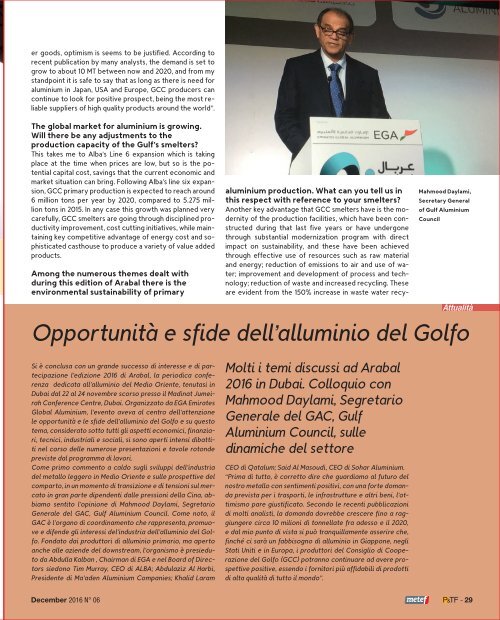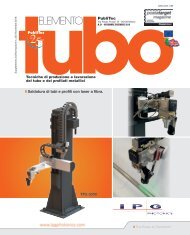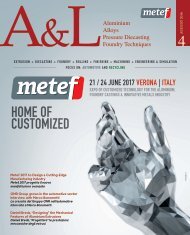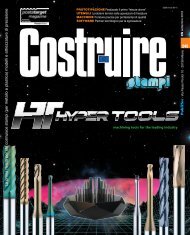sfogliabile_AL_n6_dicembre
You also want an ePaper? Increase the reach of your titles
YUMPU automatically turns print PDFs into web optimized ePapers that Google loves.
ergoods,optimismisseemstobejustified.Accordingto<br />
recent publication by many analysts, the demand is set to<br />
grow to about 10 MT between now and 2020, and from my<br />
standpoint it is safe to say that as long as there is need for<br />
aluminium in Japan, USA and Europe, GCC producers can<br />
continue to look for positive prospect, being the most reliable<br />
suppliers of high quality products around the world”.<br />
The global market for aluminium is growing.<br />
Will there be any adjustments to the<br />
production capacity of the Gulf’s smelters?<br />
This takes me to Alba’s Line 6 expansion which is taking<br />
placeatthetimewhenpricesarelow,butsoisthepotential<br />
capital cost, savings that the current economic and<br />
market situation can bring. Following Alba’s line six expansion,GCCprimaryproductionisexpectedtoreacharound<br />
6milliontonsperyearby2020,comparedto5.275million<br />
tons in 2015. In any case this growth was planned very<br />
carefully, GCC smelters are going through disciplined productivity<br />
improvement, cost cutting initiatives, while maintaining<br />
key competitive advantage of energy cost and sophisticated<br />
casthouse to produce a variety of value added<br />
products.<br />
Among the numerous themes dealt with<br />
during this edition of Arabal there is the<br />
environmental sustainability of primary<br />
aluminium production. What can you tell us in<br />
this respect with reference to your smelters?<br />
Another key advantage that GCC smelters have is the modernity<br />
of the production facilities, which have been constructed<br />
during that last five years or have undergone<br />
through substantial modernization program with direct<br />
impact on sustainability, and these have been achieved<br />
through effective use of resources such as raw material<br />
and energy; reduction of emissions to air and use of water;<br />
improvement and development of process and technology;<br />
reduction of waste and increased recycling. These<br />
are evident from the 150% increase in waste water recy-<br />
Mahmood Daylami,<br />
Secretary General<br />
of Gulf Aluminium<br />
Council<br />
Attualità<br />
Opportunità e sfide dell’alluminio del Golfo<br />
Sièconclusaconungrandesuccessodiinteresseedipartecipazione<br />
l’edizione 2016 di Arabal, la periodica conferenza<br />
dedicata all’alluminio del Medio Oriente, tenutasi in<br />
Dubaidal22al24novembrescorsopressoilMadinatJumeirah<br />
Conference Centre, Dubai. Organizzato da EGA Emirates<br />
GlobalAluminium,l’eventoavevaalcentrodell’attenzione<br />
leopportunitàelesfidedell’alluminiodelGolfoesuquesto<br />
tema,consideratosottotuttigliaspettieconomici,finanziari,<br />
tecnici, industriali e sociali, si sono aperti intensi dibattitinelcorsodellenumerosepresentazionietavolerotonde<br />
previste dal programma di lavori.<br />
Come primo commento a caldo sugli sviluppi dell’industria<br />
delmetalloleggeroinMedioOrienteesulleprospettivedel<br />
comparto,inunmomentoditransizioneeditensionisulmercatoingranpartedipendentidallepressionidellaCina,abbiamo<br />
sentito l’opinione di Mahmood Daylami, Segretario<br />
Generale del GAC, Gulf Aluminium Council. Come noto, il<br />
GAC è l’organo di coordinamento che rappresenta, promuove<br />
e difende gli interessi del’industria dell’alluminio del Golfo.Fondatodaiproduttoridialluminioprimario,maaperto<br />
anchealleaziendedeldownstream,l’organismoèpresiedutodaAbdullaKalban,ChairmandiEGAenelBoardofDirectors<br />
siedono Tim Murray, CEO di <strong>AL</strong>BA; Abdulaziz Al Harbi,<br />
Presidente di Ma’aden Aluminium Companies; Khalid Laram<br />
Molti i temi discussi ad Arabal<br />
2016 in Dubai. Colloquio con<br />
Mahmood Daylami, Segretario<br />
Generale del GAC, Gulf<br />
Aluminium Council, sulle<br />
dinamiche del settore<br />
CEO di Qatalum; Said Al Masoudi, CEO di Sohar Aluminium.<br />
“Primaditutto,ècorrettodirecheguardiamoalfuturodel<br />
nostrometalloconsentimentipositivi,conunafortedomandaprevistaperitrasporti,leinfrastruttureealtribeni,l’ottimismo<br />
pare giustificato. Secondo le recenti pubblicazioni<br />
dimoltianalisti,ladomandadovrebbecrescerefinoaraggiungerecirca10milioniditonnellatefraadessoeil2020,<br />
edalmiopuntodivistasipuòtranquillamenteasserireche,<br />
finché ci sarà un fabbisogno di alluminio in Giappone, negli<br />
StatiUnitieinEuropa,iproduttoridelConsigliodiCooperazione<br />
del Golfo (GCC) potranno continuare ad avere prospettivepositive,essendoifornitoripiùaffidabilidiprodotti<br />
dialtaqualitàdituttoilmondo”.<br />
December 2016 N° 06<br />
- 29





